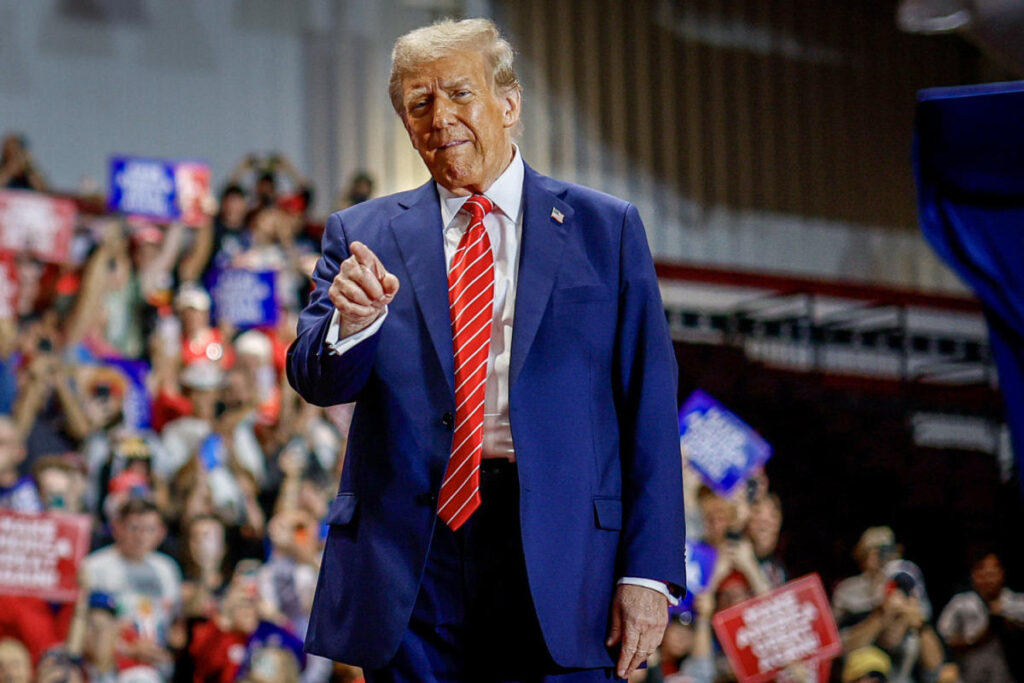With just three days remaining before the election, the atmosphere surrounding former President Donald Trump’s campaign in North Carolina is fraught with uncertainty. A Trump official candidly acknowledged that North Carolina poses a unique risk, suggesting that it could dramatically affect the election outcome. The vice president’s campaign, on the other hand, has shifted from concern to optimism regarding their chances in this critical Sun Belt state. As political teams rally their voters, both candidates recognize the importance of North Carolina, which remains a tight contest with significant implications for the broader race.
Trump’s schedule in the final days reflects a determined effort to secure North Carolina, as he has planned multiple rallies across the state. His campaign views this strategy as a necessary safeguard, emphasizing the significance of winning the state. Trump’s recent excursions into states like Virginia and New Mexico have been met with skepticism; campaign officials stress that, ultimately, North Carolina is pivotal for their overall success. Trump’s assertive rhetoric illustrates his belief that a victory in the state could translate into national triumph, as he urged supporters that winning North Carolina means winning the “whole ballgame.”
The political dynamics in North Carolina have evolved following the devastating impact of Hurricane Helene, particularly in rural areas where damage has been severe. This disaster, coupled with Trump’s controversial narrative, initially created a challenging environment for Democrats. Nonetheless, Vice President Kamala Harris maintains a firm stance, knowing that capturing North Carolina could severely hinder Trump’s path to reelection. However, Harris must also contend with the critical state of Pennsylvania, as winning North Carolina alone would not suffice for a victory; she needs to navigate the electoral landscape judiciously, especially given Republican strengths in other battleground states, evidenced by early voter turnout dynamics.
Republican early voter turnout has surged, a development attributed to aggressive messaging advocating for early voting. This trend has left Trump supporters feeling more confident going into the final stretch of the election. A Republican strategist noted that this is the first time the party has ever garnered a cumulative early vote lead in North Carolina, suggesting that the GOP’s efforts may be paying off. However, the role of unaffiliated voters remains a significant wildcard, and with both parties eyeing their respective bases, the question of voter alignment will be crucial in determining the state’s outcome.
Conversely, Democratic strategists interpret the early voting landscape differently, emphasizing factors that could favor their cause. Notably, women have shown strong support for Democratic candidates, furthering optimism among Harris’ campaign officials. The unique gender gap observed suggests that suburban voters are leaning toward Democrats, a development previously witnessed post-Roe v. Wade. These voters, combined with increased turnout from women and unaffiliated voters, create a viable pathway for Harris in North Carolina. The vice president’s recent rallies have drawn impressive crowds, showcasing a grassroots enthusiasm that could be pivotal in the closing days of the campaign.
Harris’ public appeals encapsulate a key aspect of her campaign strategy: promoting conciliatory politics amid Trump’s divisive rhetoric. By prioritizing unity and commonality in her messaging and directly engaging with North Carolinians, she aims to cement a connection that counters Trump’s narrative of division. Moreover, significant advertising advantages for Democrats, especially in the weeks leading up to the election, attempt to reinforce this strategy, although Republicans are narrowing the gap. The race in North Carolina exemplifies the broader national contest, highlighting the strategic moves both campaigns are making in pursuit of critical electoral votes that could ultimately decide the election.

